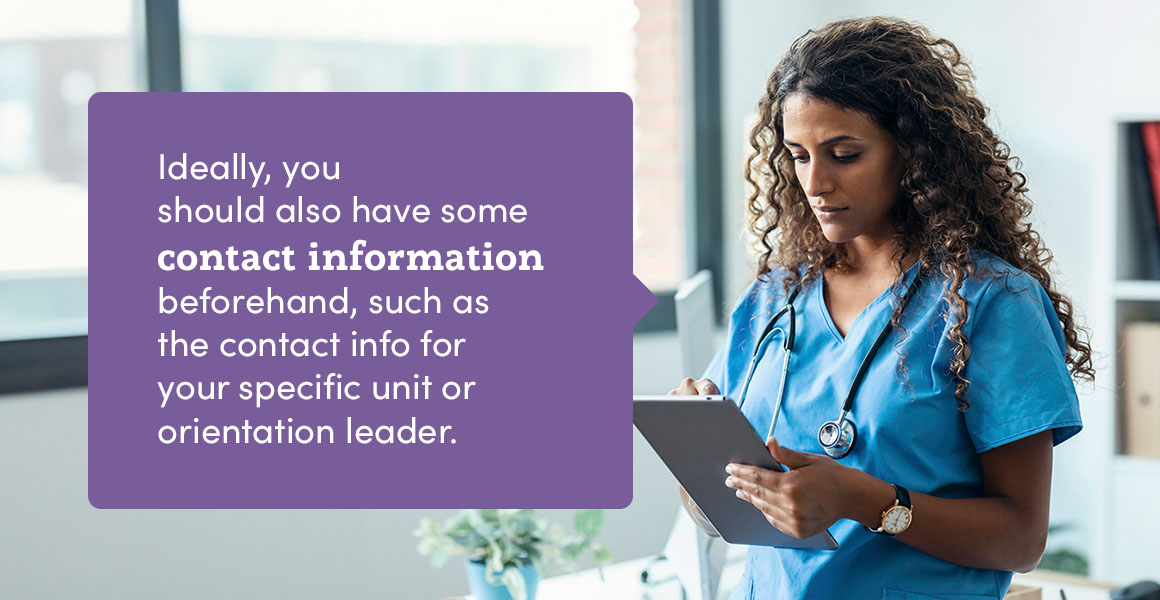An
company | Brands
Blog & News/What to Expect on Your First Day of a Travel Assignment
What to Expect on Your First Day of a Travel Assignment
Whether this is your first travel nurse assignment or you appreciate a refresher before a new assignment, knowing what you can expect on your first day can help quell anxieties and boost your confidence. Plus, being well-prepared for the first day can help you fit into the facility's workflow and give patients the care they deserve.
Learn more about how to prepare for your new job, what to expect during orientation and tips for adjusting to a new environment.
Preparing for Your Assignment
After you accept an assignment, the hospital will tell your company their requirements for travel nurses. Then, your company reaches out to you to help you schedule any testing and obtain everything the facility requires. This process is called ‘credentialing.’
Start by gathering any paperwork you already have, such as your licenses, certifications and BLS or ACLS. You will likely need to fill out some forms for the hospital. Other requirements from the facility may include:
Fingerprinting
Taking titer tests
Passing a drug screening
Testing for tuberculosis
Clearing a background check
Having a physical or taking a fit test
Proving your immunizations are up-to-date
As you collect the required documents, digitize them and keep a copy for yourself in case you need them again.
Ask your recruiter if there will be any tests, like a basic knowledge test or a medication test. Ensure you can do calculations for things like medication and drip rates.
Some hospitals require additional training modules before you start. If they do, you'll get instructions on how to access them and the deadline for completing them.
Finally, try to get a good night's sleep before your first day if you can. Even if you can't sleep, keep the TV off and put down your phone — resting in a dark, quiet space is, well, more restful, and you're more likely to actually fall asleep.
First-Day Logistics
Try not to worry if you don't receive much information from the hospital to prepare you for your first day. Some facilities provide detailed instructions, but others only include the minimum, like when and where to show up. Your recruiter will be in touch to pass along all provided instructions and help navigate any first-day questions.
More comprehensive first-day instructions may include what to wear to nursing orientation. For example, if you will start working with patients the same day, the hospital may ask you to wear scrubs. If onboarding is longer and more administrative, the dress code may be business casual for the first day or two.
If you can, test the route to the facility ahead of time. This will give you an idea of the commute time, parking situation and any concerns along the way. However you plan to get there, a test run can reduce any anxieties about not knowing how to get where you're going.

Ideally, you should also have some contact information beforehand, such as the contact info for your specific unit or orientation leader, who is often an RN or clinical specialist.
On your first day, bring a water bottle and snacks. If you bring a lunch, make sure it doesn't need to be kept cool or reheated since you may not have immediate access to a refrigerator or microwave.
Orientation and Onboarding
Many hospitals offer a general orientation and then a specific unit orientation. You likely won't be the only travel nurse starting — consider sharing your contact info so you can all help each other feel less alone. If there's a separate travelers orientation, it's often shorter than orientation for permanent staff members. However, the length varies by facility. It could be as short as four hours or as long as a week.
Orientation and onboarding processes typically start with non-clinical items, such as:
Getting a badge
Filling out paperwork
Learning where to clock in and out
You'll also learn about the hospital's policies and procedures, including:
Hand hygiene rules
Where to find supplies
Workplace harassment laws
Patient confidentiality regulations
How to chart using their electronic documentation system
If you have to pass any knowledge tests, show you completed training modules or otherwise prove you have the necessary skills, these processes are typically next.
Shadowing and Observing
If the facility does shadowing and observation, you'll be paired with a staff nurse to see how they do things in this hospital or unit. Avoid discussing how you did things at your previous job or trying to make changes. You're essentially a guest and are here to learn how to do it their way.
However long you're able to orient on the unit, observe carefully and ask a lot of questions. You'll need to know where to find the hospital's policies and procedures if you need to reference them and how to run their equipment, such as vents, monitors and crash carts. The nurse you shadow may also offer tips on charting in the hospital's system and other tricks for succeeding in your new job.
Adjusting to the New Environment
For many travel nurses, the biggest obstacle to feeling confident is simply adjusting to a new environment. When you start at a new hospital, you won't know your way around the facility or which numbers to call to reach people. Never be afraid to ask for help. See if you can get a map and a code card or cheat sheet so you know where everything is and how to get a hold of different departments, from the lab to food services.
Someone will usually be nearby to help you and answer any questions you have if something comes up unexpectedly. You might even meet other travel nurses who have been there longer and are willing to share their tips and tricks about the work culture or the location more generally.
Most importantly, try to have fun and let your skills shine. They've already hired you. Learn as much as you can and enjoy your new location.
Learn More About Traveling With Trustaff

You are a knowledgeable, experienced nurse, but no one expects you to understand everything about a new job on the first day. Approaching a new travel assignment with confidence and curiosity can make all the difference in a successful travel nursing experience. Learn more about a day in the life of a travel nurse with Trustaff.
Founded in 2002, Trustaff is more than a travel healthcare staffing company. Sure, we connect great people with great jobs, but we also foster meaningful connections between everyone we interact with. Healthcare is about relationships — between nurses and their patients, between travel nurses and staff, between hospitals and recruiters, and between our agency and you.
Partner with a company that cares about your career and your future. Create an account today to start looking for jobs, or contact us to learn more about our staffing processes.

